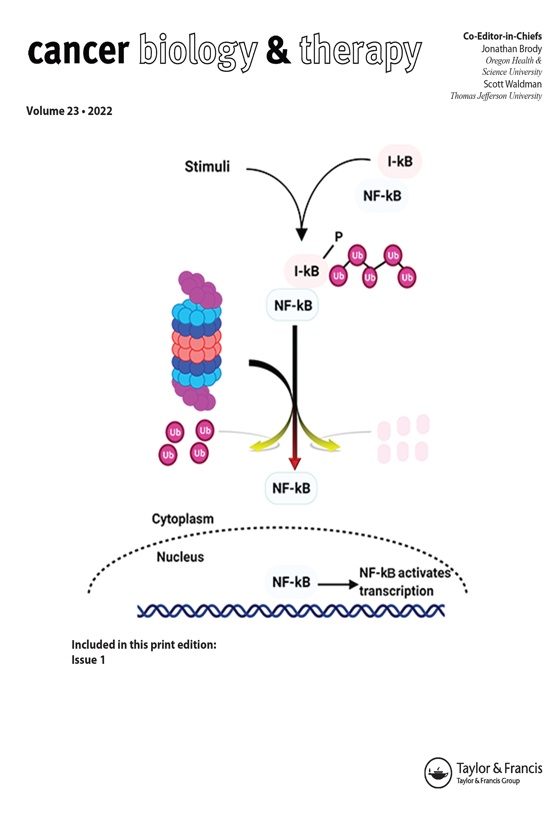Submit a Manuscript to the Journal
Cancer Biology & Therapy
For an Article Collection on
Computational and Analytical Methods for Transcriptome Analysis in Personalized Cancer Treatment
Manuscript deadline
31 August 2024


Article collection guest advisor(s)
Dr. Jinhui Liu,
The First Affiliated Hospital of Nanjing Medical University, China
[email protected]
Dr. Peixin Dong,
Hokkaido University, Japan
[email protected]
Computational and Analytical Methods for Transcriptome Analysis in Personalized Cancer Treatment
Transcriptome analysis has revolutionized cancer research, enabling comprehensive profiling of gene expression patterns and identification of key genes and pathways involved in cancer initiation, progression, and response to therapy. With the growing availability of large-scale transcriptomic datasets, there is an increasing need for computational and analytical methods to identify biomarkers and develop prognostic models for personalized cancer treatment.
One approach is differential gene expression analysis, which identifies differentially expressed genes between cancer and normal tissues or between different cancer types. Another method is gene set enrichment analysis, which identifies gene sets that are significantly enriched in a particular cancer type or patient group. Pathway analysis is another method that identifies the biological pathways that are significantly enriched in a particular cancer type or patient group.
Machine learning is also used to develop predictive models to classify patients based on their gene expression patterns. Network analysis identifies gene regulatory networks that are dysregulated in a particular cancer type or patient group. Single-cell analysis allows for the identification of rare cell populations and the characterization of cellular heterogeneity within tumors.
These methods provide valuable insights into the underlying molecular mechanisms of cancer, aiding in the development of personalized cancer treatment strategies. Combining different approaches can improve the accuracy and robustness of transcriptome analysis and lead to more effective personalized treatment options.
We invite original research articles, reviews, and perspectives that cover the following topics:
- Novel computational and analytical methods for transcriptome-based prognostic stratification and biomarker identification
- Integration of transcriptome data with other omics data, such as epigenetics, genomics, proteomics, and metabolomics
- Transcriptome analysis of cancer stem cells and tumor microenvironment, including immune cells and stromal cells, for prognostic stratification and biomarker identification
- Identification of prognostic gene signatures and their validation in independent datasets
- Development of prognostic models based on transcriptomic data and their clinical applications
- Identification of prognostic and predictive biomarkers for personalized cancer treatment
- Identification of therapeutic targets based on transcriptomic profiling
- Identification of transcriptomic changes associated with drug resistance and development of strategies to overcome it
We welcome submissions from researchers in all areas of cancer research, including basic, translational, and clinical research. We encourage authors to submit original research articles, as well as reviews and perspectives that provide a comprehensive and critical overview of the current state-of-the-art in transcriptome analysis for prognostic stratification and marker identification in cancer.
All submissions will be subject to rigorous peer-review by experts in the field. We aim to provide authors with a fair, constructive, and timely review process, and to publish high-quality articles that advance our understanding of cancer biology and improve cancer diagnosis and treatment.
Please review the journal scope and author submission instructions prior to submitting a manuscript.
The deadline for submitting manuscripts is August 31st, 2024.
Please contact Menghan Li at [email protected] with any queries and discount codes regarding this Article Collection.
Please be sure to select the appropriate Article Collection from the drop-down menu in the submission system.
Benefits of publishing open access within Taylor & Francis
Global marketing and publicity, ensuring your research reaches the people you want it to.
Article Collections bring together the latest research on hot topics from influential researchers across the globe.
Rigorous peer review for every open access article.
Rapid online publication allowing you to share your work quickly.
Looking to Publish your Research?
Find out how to publish your research open access with Taylor & Francis Group.
Choose open accessSubmission Instructions
All manuscripts submitted to this Article Collection will undergo desk assessment and peer-review as part of our standard editorial process. Guest Advisors for this collection will not be involved in peer-reviewing manuscripts unless they are an existing member of the Editorial Board. Please review the journal Aims and Scope and author submission instructions prior to submitting a manuscript.